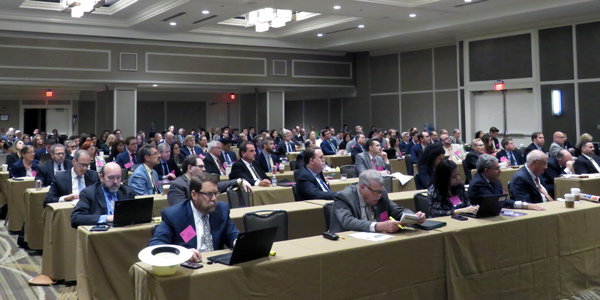WASHINGTON — FERC Chairman Kevin McIntyre, the luncheon speaker on the second day of the Energy Bar Association annual meeting last week, said he’s often asked about his priorities as head of the commission. “I love this [question] because it suggests I get to pick,” he said to laughter.
“We get to select some of the topics we work on but … I arrived in December and at that time, there was a faint ticking sound … on the 11th floor of the FERC — something awaiting prompt attention,” he continued. The ticking sound was the Dec. 11 deadline for responding to Energy Secretary Rick Perry’s Notice of Proposed Rulemaking to provide price supports for coal and nuclear generation.
“And I thought, in the [tradition of the] Hippocratic Oath: First do no harm. So, my first official and brave act as FERC chairman on Dec. 7 was to humbly request more time,” McIntyre said. “I’m happy to say that such time was granted and that we beat our extended deadline by a couple of days. And we managed a five-to-nothing order taking action on the Notice of Proposed Rulemaking that was proffered to us by the secretary, deciding as a commission that we could not adopt it in the form it was presented to us.” The commission instead opened a new docket on resilience — a proceeding that prompted more than 100 comments last week. (See related story, Don’t Rush on Resilience, Commenters Urge.)
McIntyre also discussed the commission’s challenges in determining whether state subsidies for generators based on their fuel source is unduly discriminatory. “Isn’t that an unfair market advantage? These are valid questions, not crazy questions. And we have before us the work of trying to figure out answers to them, and every bit as difficult as that, trying to figure out how to implement sensible policy steps based on those answers. This plays out in a number of different ways, and I wish I had all the answers. … As lawyers we like challenges … and boy is this one. It’s a real toughie.”
With Antitrust Risks Rising, ‘Boring is Good’

Former FERC General Counsel Max Minzner said the “defensive regimes” that have shielded energy companies from antitrust liability — the state action doctrine, federal pre-emption and filed rate doctrine — are being eroded.
One source of the erosion is litigation, he said, referencing the Supreme Court’s 2015 ONEOK decision, which found that federal pre-emption under the Natural Gas Act does not prevent state antitrust suits over pipelines’ price manipulation.
Minzner, now a partner with Jenner & Block, also cited technology that can overcome natural monopolies and regulatory changes such as the development of federally regulated gas and power markets. “And finally, one of the areas that I find most fascinating, is erosion from legislative change. The rise of the market manipulation authority within the Energy Policy Act of 2005 has an overlay on the filed rate doctrine.”
Minzner was the moderator of a panel on antitrust trends, where panelist R. Scott Mahoney, general counsel and chief compliance officer for Avangrid, sparked a discussion on the risks of making intemperate statements in emails, text messages and internal presentations that can be obtained in discovery.
Mahoney said he urges Avangrid employees “to think about doing that in a … more precise way so that you don’t create the one email that then gets waved around” as evidence of anticompetitive behavior.
Richard M. Lorenzo, chair of Loeb & Loeb’s antitrust practice, recalled the damage done to Microsoft’s antitrust defense in 1999 after testimony that company Vice President Paul Maritz had threatened to cut off rival Netscape’s “air supply.”
He cited a 1982 phone call from American Airlines President Bob Crandall to Braniff Airways President Howard Putnam — which Putnam recorded — in which Crandall said, “Raise your goddamn fares 20%. I’ll raise mine the next morning.”
“So, what you write in memos matters. [We’re] trying to emphasize to employees at all levels of the company — especially at the management level — to tone it down. Write factually as opposed to emotionally with lots and lots of adjectives. It’s very important because this stuff comes back to bite you when there is discovery.”
“People want to make a splash. People want to be remembered, and so therefore they’re always pushing the envelope with respect to PowerPoints and other ideas [using] colorful language,” added Michael O’Connor, chief legal executive for law and human resources for the Salt River Project. “And once you have one of these cases and you put it in that light and it’s thrown up in a federal district court or all over the papers, people remember that.
“And they realize that boring is good.”
— Rich Heidorn Jr.









